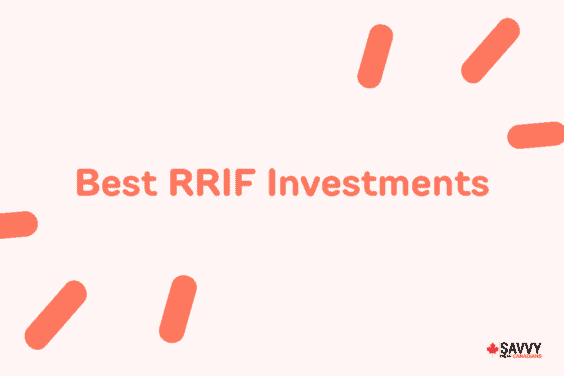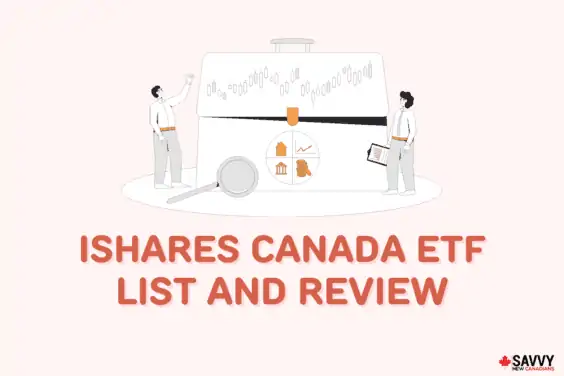DIY investing using a self-directed trading platform gives you control over your investment portfolio and can also help you save on fees.
That said, it’s not for everyone. There is a place for hands-off investing and you may be better off allowing by allowing experts to manage and rebalancing your portfolios on your behalf.
This is where online investment management services (robo-advisors) like Questwealth and CI Direct Investing come in.
Both are among the largest wealth management firms in Canada and they help you invest using expertly designed portfolios that fit your goals and risk-tolerance level.
This Questwealth vs CI Direct Investing comparison covers their account types, investment portfolios, management fees, pros, cons, and more so that you can choose the one that fits your investing needs.
What is QuestWealth Portfolios?
QuestWealth is an online robo-advisor that offers investment management services and advice to everyday investors.
It was formerly known as Portfolio IQ but was rebranded to QuestWealth Portfolios in 2018.
QuestWealth Portfolios is managed by Quest Wealth Management Inc, which is a subsidiary of Questrade Financial Group, a company that has been offering wealth management services since 1999.
That’s a solid 25-year plus experience in the Canadian markets.
Currently, Questrade has over $30 billion in assets under management and has been named a winner of the Best Managed Companies in Canada (10 times).
The platform is excellent for hands-off investors who are not comfortable self-managing their investment portfolios. They give you low-cost, diversified investment portfolios designed by experts to fit your risk tolerance and financial goals.
If you are a DIY investor, you can use the Questrade trading platform, an online brokerage for self-directed investors who want to actively build and manage their own portfolios.
Learn more about Questwealth Portfolios in this review.
What is CI Direct Investing?
CI Direct Investing is an online robo-advisor that offers professional portfolio management services to everyday investors.
It was formerly known as WealthBar and was founded in 2012 by Tea Nicola and Chris Nicola.
In 2020, WealthBar was 100% acquired by CI Financial Corp, one of the largest investment firms in Canada listed on the Toronto Stock Exchange under the ticker CIX, with over $280 billion in assets under management.
It was then rebranded to CI Direct Investing, joining the list of businesses operating under the CI brand, including Virtual Brokers (BBS Securities Inc), and Assante Wealth Management.
Today, CI Direct Investing stands out as one of the top online investment and financial planning firms in Canada for hands-off investors who don’t want to actively pick stocks and ETFs.
The platform manages and rebalances your portfolio on your behalf at a fee, so you won’t have to worry about picking stocks, ETFs, and other securities.
Learn more about the platform in this CI Direct Investing review.

Questwealth Portfolios vs CI Direct Investing: Account Types
Both QuestWealth and CI Direct Investing offer registered accounts to help investors meet their future investing needs. They include:
- Tax-Free Savings Account (TFSA)
- Registered Retirement Savings Plan (RRSP)
- Registered Education Savings Plan (RESP)
- Registered Retirement Income Fund (RRIF)
- Locked-In Retirement Accounts (LIRA)
- Life Income Fund (LIF)
In addition, CI Direct Investing offers a high-interest savings account.
QuestWealth vs CI Direct Investing: Portfolios and ETF List
Both QuestWealth and CI Direct Investing offer 5 basic portfolio types to meet the investment needs of different investors.
They use diversified ETFs to create low-cost portfolios that are customized to varying investment objectives and risk tolerance levels of different investors. They include:
- Aggressive ETF Portfolios
- Growth ETF Portfolios
- Conservative ETF Portfolios
- Safety (Income) ETF Portfolios
- Balanced ETF Portfolios
Both QuestWealth and CI Direct Investing design your portfolio using 5-7 low-cost ETFs from well-known fund companies.
Top CI Direct Investing EFTs include Horizons, Vanguard, iShares, and BMO, while Questrade’s top ETFs include iShares, BMO, and SPDR.
Both platforms also offer Socially Responsible Investing (SRI) portfolios that allow environmentally (and socially) conscious investors to invest in line with their values.
Investors can choose from aggressive to conservative SRI portfolios diversified across Cleantech ETFs, low carbon ETFs, and social and corporate governance ETFs.
Questwealth vs CI Direct Investing: Portfolio Management Fees
Both QuestWealth and CI Direct Investing assess annual portfolio management fees based on your account balance and inbuilt MER fees.
Overall, QuestWealth has lower fees in both categories.
QuestWealth charges 0.25 per year for account balances between $1,000 to $100,000, and 0.20% if your account is above $100,000. EFT MERs range from $0.17% to 0.22%. The fee is slightly higher for SRI portfolios: 0.21% to 0.35%.
CI Direct Investing charges an annual management fee of 0.6% for the first $150,000, 0.4% for the next $350,000, and 0.35% for account balances above $500,000. EFT MERs range from 0.18% to 0.26%.
Questwealth vs CI Direct Investing: Admin & Other Fees
Both platforms charge an account transfer out fee of $150 when transferring your account in full to another financial institution, and $25-$50 for partial transfers.
You may also incur full and partial account deregistration fees of $25-$100 depending on your account type.
Other admin fees that may apply include stop payment fees, NSF fees, paper statement fees, estate settlement, and wire transfer fees.
Questwealth vs CI Direct Investing: Platforms
Both QuestWealth and CI Direct Investing offer web via a web-based interface and mobile access via iOS and Android mobile apps.
- Web-based platforms: Access professionally managed portfolios and investment advice via your computer.
- Mobile app: Stay connected with your money, get investing advice, and check your investment portfolio right from your QuestMobile app and CI Direct automated savings and investment app.
Below, I show how both platforms compare when it comes to your minimum investments, customer service, security, and account sign-up promotions.
Minimum Investment
Both QuestWealth and CI Direct Investing have a minimum investment requirement of $1,000.
So once you have created your account and signed the paperwork, you need to deposit at least $1,000 to start investing.
Customer Service
QuestWealth offers customer service via telephone, chat, and email. Their customer reps are available Monday to Friday from 7:30 am to 8:00 pm.
CI Direct investing also offers customer service via phone, chat, and email. You can also visit any of the CI Financial offices across the country to get help. Their financial service reps are available Monday to Thursday from 8 a.m. to 8 p.m. ET.
Security
Both Questrade and CI Direct Investing do their best to secure your investment portfolio.
Questrade is regulated by the Investment Industry Regulatory Organization of Canada (IIROC) and is a member of the Canadian Investor Protection Fund (CIPF).
Thus, your investment account is protected up to $1M against insolvency. On top of it, Questrade adds private insurance of $10M to protect your investment.
With CI Direct Investing, you have the confidence of investing with CI Financial Corp which has been in the wealth management game since 1965.
Again, your securities are held with custodians who are members of CIPF, giving up to $1 million protection against insolvency.
Promotions
Both QuestWealth and CI Direct Investing offer first-year account opening investment incentives.
When you sign up for QuestWealth via our exclusive promotional link, you can invest up to $10,000 free for 1 year.
For a limited time, CI Direct Investing is also waiving the fees on up to $10,000 invested in the first year.
QuestWealth vs CI Direct Investing vs Wealthsimple
| QuestWealth | CI Direct Investing | Wealthsimple | |
| Account types | TFSA, RRSP, LIRA, RESP, RRIF, and LIF | RRSP, TFSA, RESP, RRIF, LIF, LIRA, RDSP, and non-registered business/personal accounts. | RRSP, TFSA, RESP, RRIF, LIRA, LIF, and non-registered corporate, personal, and cash accounts. |
| Investment portfolios | 5 types of ETF portfolios and SRI portfolios | 5 types of EFT portfolios. Plus Impact (SRI), Cleantech, Halal, and Private Investment portfolios | 3 types of ETF portfolios. Plus Halal and SRI portfolios |
| Minimum Investment | $1,000 | $1,000 | None |
| Management fee | 0.25% up to 100K0.20% above 100K | First $150K: 0.60%Next $350K: 0.40% $500K+: 0.35% | First $100K: 0.50%$100K+: 0.40% |
| Transfer fees waived | Waived on transfers over $25K | Up to $150 on transfers over $25K | Waived on transfers over $25K |
| Automatic rebalancing/Free Financial advice | Yes | Yes | Yes |
| Investing approach | Hybrid (Active-passive) | Hybrid (Active-passive) | Passive |
| Platforms | Web interface and mobile apps | Web interface and mobile apps | Web interface and mobile apps |
| Customer service | Phone, chat, and mail | Phone, chat, and email | Phone, chat, and email. |
| Promotions | Invest up to $10K free for 1 year | Invest up to $10K free for 1 year (limited time offer) | Deposit at least $500 to get a $75 cash bonus |
Questwealth vs CI Direct Investing: Conclusion
Both Questwealth and CI Direct Investing are great platforms for hands-off, time-strapped investors who don’t want to deal with the everyday management of their investment portfolios.
Both offer almost similar account types and investment portfolios. However, QuestWealth wins out due to its lower annual portfolio management fees.
Related:







